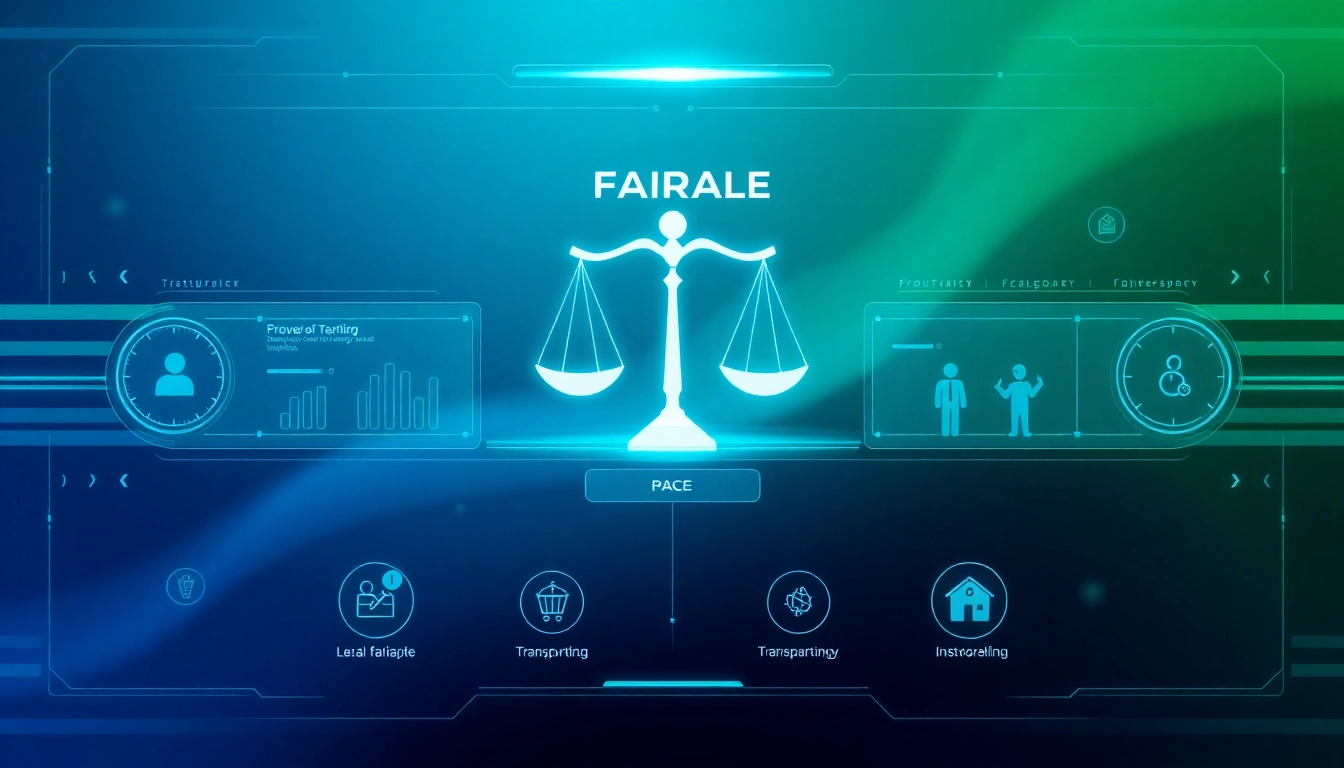Fairplay Strategies: Enhancing Fairness and Trust in Digital Decision-Making

In an increasingly complex digital landscape, ensuring fairness, transparency, and ethical integrity has become paramount for businesses across industries. The concept of fairplay extends beyond simple adherence to regulations; it embodies a strategic approach to fostering trust, mitigating risks, and achieving sustainable growth. This comprehensive guide explores the multifaceted nature of fairplay, its core principles, practical implementation strategies, legal and ethical considerations, measurable impacts, and its powerful role as a competitive advantage in today’s digital economy.
Understanding Fairplay: Definition and Core Principles
What is Fairplay in the Digital Age?
Fairplay, at its core, refers to the set of practices, standards, and systems designed to promote fairness, transparency, and ethical decision-making within digital and business ecosystems. In the digital age, fairplay has become synonymous with responsible AI governance, ethical data handling, and equitable interactions that foster trust among users, regulators, and stakeholders. It ensures that digital services do not manipulate, deceive, or unfairly disadvantage users, thereby creating a level playing field for all participants.
For example, in the financial sector, fairplay translates to transparent lending practices and unbiased credit assessments, which are crucial for building consumer trust and regulatory compliance. Similarly, in digital content and streaming, fairplay involves protecting intellectual property rights while ensuring fair access and distribution. The importance of fairplay extends into areas such as online gaming, betting, entertainment, and even social media, where integrity and ethical standards underpin user engagement and reputation management.
Key Principles Behind Fairplay Methodologies
Implementing fairplay in any operational framework involves adherence to several foundational principles:
- Transparency: Clear communication of policies, algorithms, and decision-making processes. Transparency fosters trust and enables stakeholders to understand how outcomes are achieved.
- Accountability: Assigning responsibility for actions and decisions, especially when AI systems or automated processes are involved.
- Fairness and Non-Discrimination: Ensuring that systems do not perpetuate biases or unfairly disadvantage any individual or group, fostering equal opportunities.
- Ethical Integrity: Upholding moral standards that prioritize the well-being of users, society, and the environment.
- Compliance: Aligning practices with legal regulations, industry standards, and international best practices.
These principles serve as the backbone of fairplay methodologies, guiding organizations to develop systems that are not only legally compliant but also morally sound and socially responsible.
Historical Development and Industry Adoption
The concept of fairness in digital systems has evolved significantly over the past few decades. Initially rooted in basic regulatory frameworks, it gained prominence with the rise of digital rights management (DRM) technologies, such as Apple’s FairPlay, designed to protect digital content from piracy. Over time, the focus expanded beyond intellectual property to encompass data privacy, AI ethics, and responsible use of emerging technologies.
Industry adoption accelerated as organizations recognized that consumer trust and reputation are critical assets. The introduction of rigorous standards like the General Data Protection Regulation (GDPR) in Europe, and the California Consumer Privacy Act (CCPA), underscored the necessity of fairness and transparency. Companies across sectors—technology, finance, entertainment, and gaming—began integrating fairplay principles into their core strategies, often employing AI governance platforms such as FairPlay to automate and enforce these standards effectively.
Implementing Fairplay Practices in Your Business
Step-by-Step Guide to Integrating Fairplay Systems
Embedding fairplay into your organizational processes requires structured planning and execution. Here is a comprehensive step-by-step guide:
- Assess Existing Processes: Conduct a thorough review of current decision-making, data handling, and content dissemination workflows. Identify areas where fairness may be compromised.
- Define Clear Objectives: Establish what fairness means for your organization based on industry standards, regulatory requirements, and stakeholder expectations.
- Engage Stakeholders: Include diverse perspectives—legal, technical, ethical, and customer-focused—to ensure holistic understanding and buy-in.
- Leverage Technology Solutions: Choose reliable fairplay solutions such as AI governance tools or content protection systems that align with your needs.
- Develop Policies and Standards: Formalize guidelines that promote transparency, accountability, and ethical decision-making across all levels.
- Integrate Into Operations: Embed fairness protocols into daily operations, training staff on ethical standards, and utilizing automation where feasible.
- Monitor and Audit: Regularly review practices through audits and compliance checks to ensure standards are upheld.
- Iterate and Improve: Continuously refine processes based on feedback, technological advances, and evolving industry norms.
Choosing Reliable Fairplay Solutions and Technologies
Selecting appropriate technology is vital. Leading solutions like FairPlay offer AI governance platforms that enable organizations to create smarter AI, make safer decisions, and manage risk efficiently. When evaluating solutions, consider:
- Compliance Capabilities: Does the system support relevant regulations like GDPR or industry-specific standards?
- Bias Detection and Mitigation: Does the platform include tools to identify and reduce biases?
- Transparency Features: Can the system explain its decision processes?
- Integration and Usability: Is it compatible with existing infrastructure?
- Support and Scalability: Does the provider offer ongoing support and growth options?
Common Challenges and How to Overcome Them
Implementing fairplay practices is not without hurdles:
- Resistance to Change: Overcome through leadership advocacy, clear benefits communication, and staff training.
- Technical Limitations: Address by selecting flexible, scalable solutions and investing in staff upskilling.
- Bias and Data Issues: Regularly audit datasets and refine algorithms to minimize inadvertent discrimination.
- Regulatory Complexity: Stay updated with evolving laws and partner with legal experts to ensure compliance.
Legal and Ethical Considerations for Fairplay
Regulatory Frameworks Supporting Fairplay
Global and regional regulations increasingly mandate fairness and transparency, especially in data-driven sectors. Notable frameworks include the European Union’s GDPR, which emphasizes data subject rights, and the U.S. Federal Trade Commission’s guidelines on truthful marketing and fair practices. Many countries are proposing or enforcing laws that explicitly require organizations to implement fairness protocols, making compliance a competitive necessity rather than an option.
Ethical Standards and Industry Compliance
Beyond legal mandates, promoting a strong ethical culture is critical. Frameworks like the IEEE’s Ethically Aligned Design and industry codes of conduct serve as benchmarks. Upholding these standards involves proactive measures like bias audits, stakeholder engagement, and transparent reporting. Ethical principles act as a safeguard against reputational risk and foster sustained consumer trust.
Case Studies of Fairplay in Action
For instance, a major fintech company integrated an AI governance platform to monitor lending algorithms, reducing bias against marginalized groups and improving approval fairness. This initiative led to increased customer satisfaction, regulatory commendation, and a marked rise in market share. Similarly, streaming giants employ DRM technologies like FairPlay Streaming to safeguard content rights while maintaining user privacy and access fairness, setting industry standards.
Measuring the Impact of Fairplay Initiatives
Performance Metrics and KPIs to Track
Effective evaluation of fairplay initiatives involves monitoring key performance indicators (KPIs):
- Bias Reduction: Measure disparities across demographic groups before and after implementation.
- User Trust & Satisfaction: Gather feedback via surveys and Net Promoter Scores (NPS).
- Regulatory Compliance: Track audit results and compliance reports.
- Operational Efficiency: Assess reductions in dispute resolution times and error rates.
- Reputation Metrics: Monitor media sentiment and stakeholder perception.
Case Studies Showing Successful Outcomes
A global e-commerce platform adopted fairplay AI auditing tools, resulting in a 30% decrease in biased recommendations and a 20% increase in customer trust scores. Similarly, a financial institution’s transparency initiative led to reduced complaints and favorable regulatory reviews, demonstrating that fairplay investments can directly impact bottom-line results.
Continuous Improvement and Future Trends
The future of fairplay lies in adaptive, AI-powered systems that evolve with changing norms. Trends include increased adoption of explainable AI, real-time bias mitigation, stakeholder-specific fairness models, and integrated compliance dashboards. Organizations that embed continuous feedback loops will sustain their fairplay standards and adapt proactively to regulatory and societal shifts.
Leveraging Fairplay for Competitive Advantage
Enhancing User Trust and Brand Loyalty
Implementing robust fairplay practices enhances credibility, fostering long-term user trust. Transparent algorithms, content protection, and consistent ethical standards position your brand as a responsible leader, encouraging repeat engagement and positive word-of-mouth recommendations.
Innovative Uses of Fairplay in Different Sectors
Beyond compliance, fairplay opens avenues for innovation. For example, AI-powered fair content moderation enhances user experience on social platforms. In online betting, transparent and fair algorithms improve user engagement and reduce disputes. In media streaming, DRM solutions like FairPlay Streaming protect content rights while ensuring respectful user access, supporting content creators and distributors alike.
Strategic Positioning and Branding Opportunities
Companies that proactively champion fairplay can differentiate themselves in crowded markets. Certification labels, public reporting, and stakeholder engagement showcase your commitment to ethics and fairness. Such positioning appeals especially to younger consumers, social-conscious investors, and global regulators.


